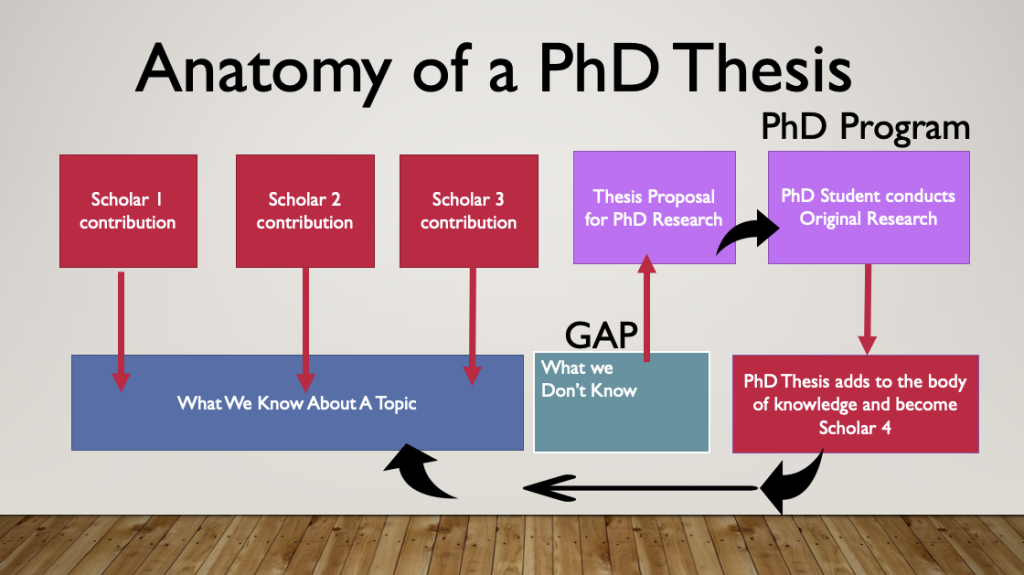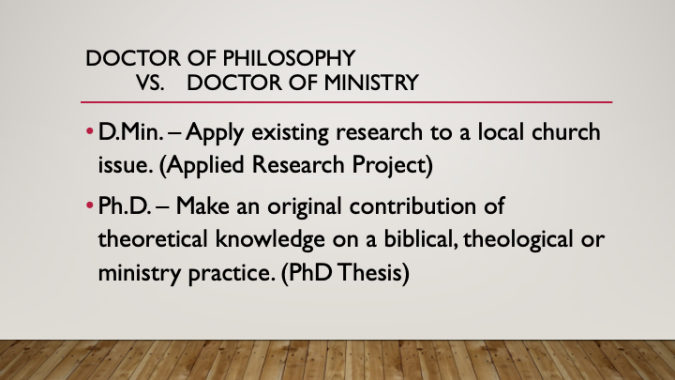Click to join the conversation with over 500,000 Pentecostal believers and scholars
Click to get our FREE MOBILE APP and stay connected
| PentecostalTheology.com



Know the Difference Between a Ph.D. and a D.Min.
For theological doctoral degrees, there are two options: Ph.D. and D.Min. But these are very different degrees.
A Doctor of Ministry (DMin) is a Professional Doctorate designed to produce expert practitioners of ministry. It is an “Applied Research” degree, meaning DMin Students draw from what has been produced by scholars in the field of research in order to apply that knowledge to a particular ministry context. They write a project or dissertation about how they can address that local ministry problem through research. The conclusions are practical in nature as an implemented project, but does not usually produce universally applied conclusions.
A Doctor of Philosophy (PhD) is an academic research degree that creates new knowledge in a field of study or discipline. Its goal is to add new knowledge to the field. This is based on “original research” rather than describing what is already known (as one would in a research paper). The PhD student is expected to address a theoretical issue in biblical studies, history, or theology by drawing from from original sources to fill a gap with new knowledge that adds to the scholarly field. The goal for the student is expertise and scholarship.
In this way, a DMin applies the knowledge that PhDs create. One is focused on expertise in the practice of ministry, the other is focused on expertise in knowledge and theories of theology and ministry. This is why those who want to teach in Higher Education should pursue A PhD, not a DMin. A PhD gives you the expertise to be able to teach about that field and publish more new knowledge in that field. A DMin only qualifies you to teach about practical ministry.
So if your goal is to help the local church do ministry better, do a D.Min (I recommend ORU’s DMin, which I teach in as well.). If your goal is to study something no one has studied before, do a PhD. But also make sure that the PhD program has scholars with expertise in the field you want to study. Studying under an expert in your field is part of the process of becoming a scholar yourself. Therefore, make sure you are in the right program for your educational goals.
Master a Field Before Starting
One of the problems with the M.Div requirement for getting into PhD programs is that most programs don’t require a thesis. This makes the task of coming up with an original thesis in the field of theological, biblical, historical, or contextual studies very difficult. Because the M.Div trains students broadly in ministry, many PhD students just have not read enough in a specific field and topic to know what kind of study they should do that would be original to the field.
Most PhD programs assume the following before you enter: 1) you have a specific topic in a field, 2) you know the conversations in that field, 3) you can write about that topic in your coursework to help you begin to research for your dissertation.
Therefore, it is important that you read everything scholars are already saying about your potential PhD thesis topic BEFORE applying to a program. This way you can have a preliminary understanding of the gap in research that your thesis can potentially fill.
A good key to test if you are ready: Can you identify the last 5 major studies/dissertations that address the main aspects of your topic and can you summarize thier conclusions? If you can’t, you aren’t ready yet to enter the PhD program and write a Research Proposal.
Understand the Anatomy of a PhD Thesis
As previously noted, a PhD thesis is an original contribution to knowledge. That contribution must start with a literature review of what has already been said by scholars. From that baseline of information, the gap in research is established that asks a set of research questions that make the case for that a new study is necessary to fill the gap in that field. This rational becomes your research proposal. When you pass your classes, you start the dissertation phase where your original research involves engaging the original sources to uncover what previous scholars missed or has not been studied before. The PhD researcher analyzes that knowledge (or data) to develop a new theory that is publishable and contributes to the field. That knowledge becomes the new baseline for what the next researcher builds on when writing on the topic. This is how knowledge in various academic fields grow. The chart below demonstates this process.

To illustrate, when I wanted to do a PhD on Assemblies of God eschatology, I knew by reading that 1) Pentecsotal scholars had serious issues with dispensationalism, 2) that scholars said eschatology was integral to Pentecsotal theology, and 3) that the AG had 1/4 of its theological tenets devoted to eschatology. But no one had yet studied where the AG got its position, why it was so important, and how the AG navigated the problems that Pentecostal scholars have identified (those were my main research questions). So I proposed that a study of AG views was needed, in particular how AG believers expressed their eschatology in denominational publications, in order to explain AG eschatology. I didn’t know the conclusion, but I knew I had a research proposal that was original and that would make a contribution to Pentecostal history, AG history, and eschatology.
So just like I articulated here, before you start a PhD program, make sure you have mastered a field and are able to summarize your topic just like I did here. Even if its not totally clear, you should have at least this level of knowledge about where the conversation is today.
Become an Expert, Rather Than A Graduate
Most people go to seminary to get theological training and earn a degree to qualify them for ministry. In many ways, that degree helps them get a job. Unfortunately that is not always the case for the PhD. Its true, you can’t teach in a university without one, but this is not vocational training to teach you how to be a college theology teacher. The goal of the PhD program is to mold you into an expert in a field.
Therefore, the thesis isn’t the long paper at the end of the degree; the PhD thesis is the goal of everything you do in your program. The goal is contribution to scholarship, not to get good grades to earn a degree. If you don’t want to be a scholar, if you don’t want to write books and articles, and if you don’t want to converse with other scholars about your field, then a PhD is not really the right degree.
The job market for academics is extremely difficult. At some point, you have to come to the place where the degree is an end unto itself, rather than a means to an end. As I wrote in another blog, you have to realize that your research is the contribution that will live on long after you. And that this is worth doing whether you ever get a job out of it or not. If you have any other expectations, you may be setting yourself up for disappointment.
Be Prepared to be in Over Your Head
When I give this talk at the beginning of my research methods class, most of my students feel completely overwhelmed. But I assure them, this is exactly how they should feel. To be honest, you should be prepared for several years of feeling completely overwhelmed and completely inadequate. They even have a name for that feeling, it is called the “imposter syndrome.” But I assure you, this is normal and entirely necessary.
The first step in becoming an expert is to realize just how much you don’t know. The problem with most theological students is they know enough to have built some narrative about a topic. But, they haven’t read enough to know what they don’t know so they often operate under false assumptions. But you can’t make that turn until you have thoroughly understood what scholars have already uncovered about you topic. That is literally reading hundreds of books and articles on your topic. To truly do it right, you must prepare yourself to challenge and test everything you think you know and realize how little you actually know before you are ready to discover what you need to know to become an expert. You must say goodbye to simple ways of understanding the world and delve into the immense complexity of scholarship. Every topic complicated. Every conversation is nuanced. Every fact is questioned. Therefore, every single claim must be supported by sources or research. Every word matters!!
“The first step in becoming an expert is to realize just how much you don’t know.”
So be prayed up and sure of your calling. Pray alot while you read and prepare. You will be challenged by your professor over every word you write in your assignments and classes so be prepared to be humble, teachable, and resilient. Be prepared to want to quit several times over your program, but also be prepared to fight through that pain and persevere. Be prepared for how much it costs to do a program and for the fact that it may to translate into a full time job. This is a hard journey ahead. It is a daily journey ahead. You will pushed beyond your intellectual capacity. But you are not alone in your weakness, we were all right were you are. And also know that Spirit of God will be there. Remember that the Spirit “helps us in our weaknesses”, even in your PhD studies. Lean deeply into him and pray in the Spirit alot. If you want to read about the journeys of other Pentecostal academics, I recommend Pentecostals in the Academy by Robby Waddell and Steven Fettke to encourage you on your journey.





Anonymous
Philip Williams John Mushenhouse this answers Jerome Herrick Weymouth when he stated
I have seen Pentecostal Churches that are intellectual ignorant.
They state “If you go to Bible college, you are poisoned against the anointing, and you favor men’s teachings. All you need is the anointing!” And for this many of these Preachers get sucked up into heresies and teach demonic doctrines.
NOT that Link Hudson has phd in theology, any church credentials or ministerial
Anonymous
Troy Day PhD and learning aren’t the same and may be detrimental to learning.
Anonymous
Philip Williams says who – how would you know?
Anonymous
Troy Day the number of PhD’s who prefer working for me, including some of the most eminent DSS scholars.
Anonymous
Troy Day the problem is that many wouldn’t know the anointing of God if they saw it. They too often think emotionalism = anointing. Hence the backwoods ignorance and superstition we see so often.
Anonymous
John Mushenhouse the problem is no one works for Philip Williams apart from father NOAH in his wiled imagination
Anonymous
Troy Day I prefer they work for the Lord.
Anonymous
PhD programss tend to be academic research focused. Mine was.
Anonymous
Link Hudson was my assessment to Philip Williams but he thinks instead of research is more of learning 🙂 oh well John Mushenhouse
Anonymous
Link Hudson It is called the research degree in most academic institutions.
Anonymous
John Mushenhouse but Philip Williams wouldnt know anything about academic institutions.